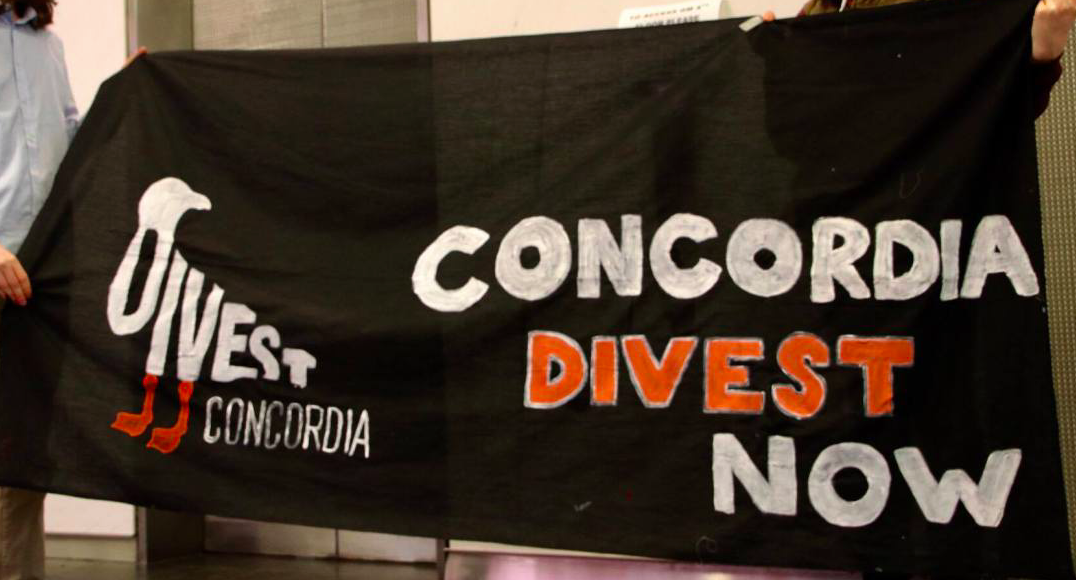Fighting climate change by pulling Concordia’s investments.
Two student groups, Sustainable Concordia and the Divest Coalition, have been working together to pressure the university to divest from fossil fuels.
During a Divest 101 workshop hosted by both Sustainable Concordia and the Divest Coalition, Emily Carson-Apstein, the external and campaigns coordinator for Sustainable Concordia, used a tree analogy to explain why divestment is a solution for climate change.
She said climate change is like a tree. The branches and leaves are the symptoms of climate change, such as forest fires and air pollution. The trunk of the tree corresponds to oil companies, big business corporations, even universities, which, in one way or another, worsen the effects of climate change. Carson-Apstein said divestment was like the chainsaw that could cut away at the trunk to stop the symptoms at the top from growing back.
During the workshop, it was mentioned that Laval University was the first Canadian university to divest from fossil fuels. Although having one university do so would not make any noticeable environmental change, Carson-Apstein argued that withdrawing funds is still important. If Concordia were to pull their investments like Laval University did, other universities could potentially do the same.
Sustainable Concordia “envisions a university which teaches and demonstrates sustainability principles of ecological health, social justice, and economic equality,” according to its mission statement.
The group wants to see the university run in a non-hierarchical manner, which would enable students, faculty, staff and administration to work together to achieve “transparency and maximum participation,” according to its website.
Approximately 10 per cent of the university’s foundation funds are invested in companies that “may have some connection with fossil fuels,” said Mary-Jo Barr, Concordia University’s spokesperson.
Student groups like Sustainable Concordia and the Divest Coalition want to see the university pull their investments from these companies. They believe that pulling the investments is just as important as investing in clean energy because it takes money away from industries that play a role in worsening the effects of climate change.
Divesting from these industries is easier said than done, according to Barr. “Many funds are pooled investments, making it difficult to isolate or clearly exclude fossil fuel investments,” she said. “The university and its foundation have a fiduciary responsibility to ensure the greatest possible return on investment in order to meet their objectives of providing the most benefit to the recipients of the CUF’s funds: Concordia students and researchers.”
The returns from these and all other investments go back into the university’s endowment fund, which helps pay for scholarships and bursaries.
As a compromise, “the board of the Concordia University Foundation has opted to maintain a broader focus on sustainable investment rather than adhering to a narrower objective of divestment,” said Barr.
The University put $5 million towards the Sustainable Investment Fund in 2013 and promised to increase it based on its performance. However, according to Carson-Apstein, the amount hasn’t changed since then.
“The $5 million fund was created because of pressure by students, but students still don’t have any control over what it is invested in. The school just agreed to invest that money sustainably,” said Carson-Apstein.
The university also works with student groups like Divest and Sustainable Concordia through the Joint Sustainable Investment Advisory Committee (JSIAC), whose goal is to make recommendations regarding socially and environmentally responsible investments to different governing bodies at Concordia.
The student groups have two seats on the JSIAC, and during these meetings, they participate in discussions, but “don’t have any influence on the agenda, minutes, or what happens with the decisions made in the meetings, especially in the Joint Sustainable Investment Advisory Committee,” said Carson-Apstein.
Archive Photo by Savanna Craig.




